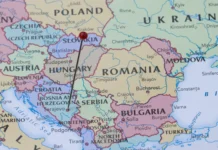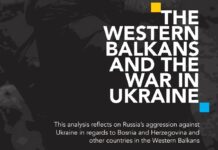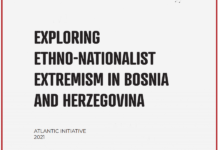SIGNIFICANCE: Despite the perceived risk of Islamist terrorism expanding in the Balkans with ISIS recruitment and returnees from Syria and Iraq, a report suggests those inclined to violent radicalism are more likely to direct their attention elsewhere.
FULL BRIEFING
Balkan fighters with the Islamic State who return to their home countries pose a limited risk to the region, according to a report published by the Atlantic Initiative (AI), a Sarajevo-based NGO, on June 11.
The AI notes recent research shows that 11 percent of returnees have engaged in some form of violence on returning home, and that terrorists with real combat experience have proved far more dangerous than those who have only ever operated in domestic cells. Terrorist attacks in other countries including Tunisia, France, and the UK have been carried out or attempted by ISIS returnees.
Nonetheless, the AI is cautious about exaggerating the risk, saying that “fear of the possible danger of returnees is thus not unfounded.” The supposed threat of Islamism has been used as a rallying call by non-Muslim politicians, including Bosnian Serbs and Macedonians.
“This is a serious question, but one that has been politically manipulated and overblown by politicians flogging a narrative they’ve been flogging for a long time,” Kurt Bassuener, a Sarajevo-based policy analyst and senior associate at the Democratization Policy Council, told Monitor Global Outlook.
A recent attack on a police station in Zvornik, in Bosnia’s Serb Republic, which resulted in the death of one policeman, was initially reported as an Islamist incident, but sources have now cast doubt on the link to religious extremism, a diplomat with long period of experience in Bosnia told MGO.
In Monitor Global Outlook’s view, while there is some risk of lone-wolf attacks in the Balkans, radical Islam is not a political movement with widespread popular appeal. Individuals from the Balkans inclined to violent radicalism are more likely to direct their attention elsewhere, such as Syria and Iraq, than their home countries, where there are few obvious targets.
Islamists figure there is no point attacking Bosnian businesses – as they would simply lose local support by killing innocent Muslims, and the business have no link to the war. The Western Balkans have generally engaged only to a moderate extent in the “war on terror,” far less than some Western European countries, and North America.
Exceptions include US embassies in the Balkans. The US Embassy in Sarajevo was attacked in a lone wolf incident in 2011, with no casualties. US companies present in the region such as Bechtel Corp. have a moderately higher risk of attack than local counterparts because the US is viewed as the leader of the war on terror.
But the risk is still low compared with operations in Western Europe and the Muslim world, where attacks gain more media attention and are seen as an assault on the enemies of Islam.
In the report, it’s noted that between December 2012 and December 2014, 156 men, 36 women, and 25 children of Bosnian citizenship traveled to Syria or Iraq. By January 2015, 48 men and 3 women had returned, while 26 Bosnians had been killed.
While these numbers are small, the proportions traveling from Bosnia are significant, given the country’s population of just 3.8 million. The report notes that returning radicals also have links to counterparts elsewhere in the Balkans, particularly Serbia, Albania and Kosovo. Furthermore, a small but significant network of Salafist radicals exists in Bosnia, and ISIS has proven its international reach in indoctrination and recruitment.
As the AI and Mr. Bassuener say, the biggest issue in the Balkans, and particularly Bosnia, is not the proliferation of Islamists bent on attacks on the region, but the poor monitoring of the very few who may be planning attacks. Bosnia’s multitiered government, divided between two entities (and a self-governing unit at Brcko) and 10 cantons, with various parts often at loggerheads, makes monitoring and controlling terrorists threats more difficult.
Other countries in the region also have weak public administrations and porous borders, as a deadly clash between ethnic Albanian guerrillas, mostly from Kosovo, and Macedonian forces recently demonstrated. Finally, the high levels of youth unemployment and the failings of the education system make radicalization a greater threat.
“The issue is an institutional and structural one,” says Bassuener. “The question is whether state and sub-state units are wired up to deal with it, and I think the answer is no.”
In MGO’s view, the situation creates opportunities for companies marketing software for intelligence and security services, such as Expert System, Intergraph Corp., and Gamma Group. All of these companies are foreign-based and looking to expand. At least one company is believed to be planning a drive to sell in CEE.
Source: http://www.monitorglobaloutlook.com (26. June 2015.)
—————————————————————–
DOWNLOAD PUBLICATION:








